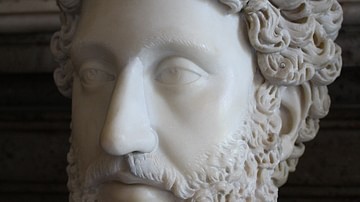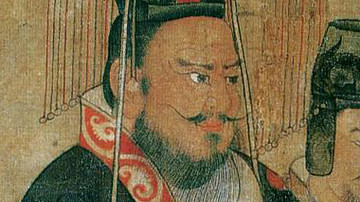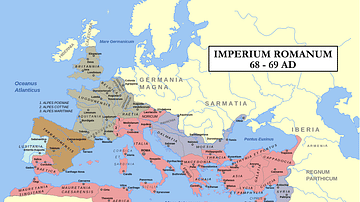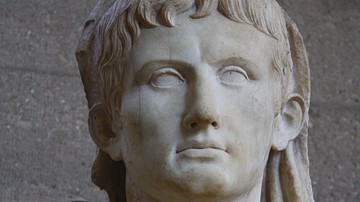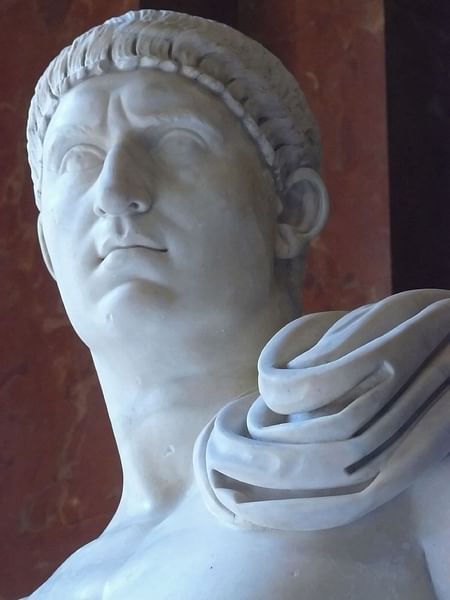
Otho was Roman emperor from January to April 69 CE. Immediately after the assassination of Galba, Otho, the governor of Lusitania, was proclaimed emperor by the army. However, the unrest that existed in the short reign of Galba would spell doom for the newly named leader of the Roman Empire, the second in the “year of the four emperors.”
The youngest of three children, Marcus Salvius Otho was born in the town of Ferentinum in Etrusia (forty miles north of Rome) on April 28, 32 AD to the non-aristocratic family of Lucius Otho and Albia Terentia. There was some speculation, according to historian Suetonius, that Otho was actually the illegitimate son of Emperor Tiberius. One of the few references to his youth was when Suetonius mentioned that Otho's “early wildness earned him a many beating from his father.” Otho was “of medium height, bow-legged, and with splay feet but almost as fastidious about appearance as a woman …. and a well-made toupee covered his practically bald head.”
Much of Otho's political success was due to his friendship with Emperor Nero, not only did he serve as a confidant and companion but apparently also knew all of the ruler's schemes and darkest secrets. However, a fallout occurred over the mutual love of a woman, Poppaea Sabina. In order to keep her from marrying another, Nero asked Otho to marry her, giving the emperor time to rid himself of his wife, Octavia. With Octavia out of the way (first by exile then by “apparent suicide”), Nero was free to marry Poppaea, but Otho refused to divorce her—- he had fallen in love. So, the question arose: What to do with Otho? The solution: Nero sent him to be the new governor of Lusitania (modern-day Portugal) in 59 AD —- in every sense an exile. Suetonius wrote, “Fear alone kept Nero from doing more than annul the marriage and banish Otho to Lusitania as its governor-general.” Otho was to serve as governor for ten years.
As the empire began to crumble under the excesses of Nero's rule, Otho, together with Vindex of Gaul, persuaded Galba, governor-general of Spain, to lead a revolt and overthrow Nero. In June of 68 AD Nero, fearing his execution, committed suicide (with help) and Galba was named the new emperor.
Galba's reign, however, did not prove to be the success everyone had hoped. The army, which had once supported Galba, turned against him when he withheld the money he had promised them. Otho became further disillusioned when Galba failed to name him as successor to the throne. Suetonius wrote, “Disappointment, resentment and a massive accumulation of debt now prompted him to revolt. With the support and assistance of the Praetorian Guard, Otho masterminded Galba's assassination. On January 15, 69 AD, Otho was proclaimed emperor.
One of his first acts as emperor was to appear before the Senate where he proclaimed he would “respect the people's sovereign will.” He reinstituted the gladiatorial games, rewarded the officials and soldiers who had helped him overthrow Galba, completed Nero's Golden Palace, and lastly, restored the fallen statures of Nero and Poppaea. He even took the name of Nero Otho.

His short reign, however, was to come falling down around him. Vitellius, governor-general of Germany, had been the choice of many to be the new emperor —- even before Galba. Otho felt he had little to fear from Vitellius because his quarrel had been with Galba. Besides, he felt he could reason with the governor, even sending him a letter, hoping to reach a peaceful agreement. If not, he believed he had plenty of time to raise an army, but this was not to be.
As Vitellius advanced towards Rome, Otho, with only a force of nine thousand, went to meet him at Bedriacum, three hundred and fifty miles from Rome. The battle did not go well for Otho and to prevent a civil war, Otho committed suicide —- April 16, 69 AD. He was only thirty-six years old. Vitellius was proclaimed the new emperor. Cassius Dio in his Roman History quoted Otho as saying, “I shall free myself that all men (sic) may learn from the event that you chose for your emperor one who would not give you up to save himself, but rather himself to save you.” Concerning the emperor's death, Suetonius said, “Otho decided on suicide. It is more probable that his conscience prevented him from continuing to hazard lives and treasure in a bid for sovereignty than that his men had become demoralized and unreliable…” His men, however, remained loyal to him, even in death. “Several soldiers visited the death-bed where they kissed his hands and feet, praising him as the bravest man they had ever known, and the best Emperor imaginable…”


